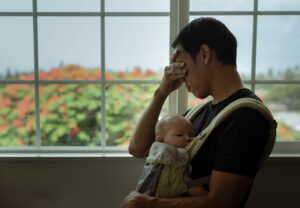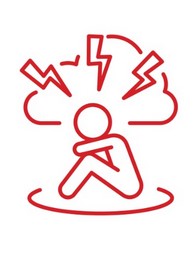Resentment
We can understand resentment as a mixture of feelings of frustration, anger, envy, and sadness. This emotion can surface when we feel things are unfair or unjust, or if we fail to set boundaries, or we feel let down. It is usually not a single event but multiple events that build up over time. Resentment can make us feel ill about something that we think is wrong. Resentment can be an individual or shared experience. It is a complex emotion that can be shaped by and shape other negative feelings like loneliness, fear, grief, etc.
PSP family members might feel resentment toward the PSP’s job requirements such as shiftwork or unscheduled overtime. PSP’s work is usually less flexible than typical jobs. Rotating and unpredictable shifts have to be accommodated. There could be resentment over the camaraderie/companionship the PSP has with coworkers. PSP family members have reported feeling resentment when the PSP job is prioritized and seems to be more important than family.
Resentment could result in:
- a lack of physical and emotional support
- emotional unavailability
- reduced communication
- lack of understanding
Sources of SSO resentment
Click to expand
- SSOs may give up their careers or reduce hours to manage the home because the PSP’s work schedule and time at home is so unpredictable. The PSP career may be given priority over the SSO career.
- Household tasks including childcare and eldercare may primarily be the responsibility of SSOs.
- SSOs may be left to shift plans and schedules and pick up the slack when there is a unexpected schedule change (e.g., overtime or call-ins).
- Explaining a sudden absence of the PSP family member to friends and family and dealing with disappointment can be difficult.
- Work and home transitions can be challenging. SSOs may try to keep children quiet and allow PSP time to recover from a shift when they are experiencing stress and fatigue themselves.
- SSOs may feel that the sacrifices they make and the responsibilities they take on are expected and taken for granted. It can be frustrating if their contributions are not valued or recognized.
Continuously shifting schedules, plans, and routines
PSP families have identified the many ways that the unpredictability of PSP work interferes with family life.
Over the years these experiences become ‘normal’ parts of daily life for PSP families. SSOs and other family members are expected to adapt. But, over time, with many changes and disruptions, SSOs can feel that they are taken for granted and ‘the job’ is more important.
Many PSP families understand, and many accept the risks and requirements of the job. However, the constant nature of the disruptions can pile up and become more than families can manage. The seemingly endless demands and the lack of recognition for the role of family members can be frustrating. Families feel resentment toward ‘the job’ which is central to tensions and conflicts that arise.
References for this page (click to expand)
Alrutz, A. S., Buetow, S., Cameron, L. D., & Huggard, P. K. (2020). What happens at work comes home. Healthcare (Basel), 8(3), 350. https://doi.org/10.3390/healthcare8030350
Black, A. (2004). The treatment of psychological problems experienced by the children of police officers in Northern Ireland. Child care in practice : Northern Ireland journal of multi-disciplinary child care practice, 10(2), 99-106. https://doi.org/10.1080/13575270410001693330
Carrington, J. L. (2006). Elements of and strategies for maintaining a police marriage: The lived perspectives of Royal Canadian Mounted Police officers and their spouses. ProQuest Dissertations Publishing.
Cigrang, J. A. et al. (2016). The Marriage Checkup: Adapting and Implementing a Brief Relationship Intervention for Military Couples. Cognitive and Behavioral Practice, 23, 561-570.
Cowlishaw, S., Evans, L., & McLennan, J. (2008). Families of rural volunteer firefighters. Rural Society, 18(1), 17-25. https://doi.org/10.5172/rsj.351.18.1.17
Ewles, G. (2019). Enhancing organizational support for emergency first responders and their families: Examining the role of personal support networks after the experience of work-related trauma. PhD Thesis. University of Guelph.
Merolla, A. J. (2010). Relational maintenance during military deployment: Perspectives of wives of deployed US soldiers. Journal of Applied Communication Research, 38(1), 4–26. https://doi.org/10.1080/00909880903483557
Miller, L. (2007). Police families: Stresses, syndromes, and solutions. The American Journal of Family Therapy, 35(1), 21-40. https://doi.org/10.1080/01926180600698541
Regehr, C. (2005). Bringing the trauma home: Spouses of paramedics. Journal of Loss & Trauma, 10(2), 97-114. https://doi.org/10.1080/15325020590908812
Regehr, C., Dimitropoulos, G., Bright, E., George, S., & Henderson, J. (2005). Behind the brotherhood: Rewards and challenges for wives of firefighters. Family Relations, 54(3), 423-435. https://doi.org/10.1111/j.1741-3729.2005.00328.x
Roberts, N. A., & Levenson, R. W. (2001). The Remains of the Workday: Impact of Job Stress and Exhaustion on Marital Interaction in Police Couples. Journal of marriage and family, 63(4), 1052-1067. https://doi.org/10.1111/j.1741-3737.2001.01052.x
Watkins, S. L., Shannon, M. A., Hurtado, D. A., Shea, S. A., & Bowles, N. P. (2021). Interactions between home, work, and sleep among firefighters. American Journal of Industrial Medicine, 64(2), 137-148. https://doi.org/10.1002/ajim.23194
Try: Skill-building Exercises
Need Something More?
Check out our self-directed Spouse or Significant Other Wellbeing Course.
Unpredictability: Sleep disruptions
Sleep can be disrupted for PSP families for a number of reasons. When PSP are at work, family members may have a hard time falling or staying asleep due to worry. The timing when PSP leave and return home can be out of sync with family members, interfering with their sleep and sleep routines. When PSP need to sleep in the day, family members change their activities to maintain quiet.
Both the shift work and the unpredictability of PSP work can interfere with sleep. In some PSP sectors, such as volunteer firefighting, there may be an expectation for a PSP to be on call often, leading to the possibility of call-ins at any time. This disrupts both their sleep and the sleep of their spouse/significant other (SSOs) and family members.
Unexpected call-ins and overtime can also lead to inconsistent schedules for children. Wake up, bedtimes, and nap times might get rearranged due to the unpredictability of PSP work.
Why is it so hard to sleep when the PSP is at work?
PSP’s daytime sleep is out of sync with family life

- Family members feel like they have to be especially quiet.
- Routines and extracurriculars for family members can be disrupted.
- Weekends and holidays when the whole family tends to be home are particularly challenging.
- Babies and young children who may cry create noise that interferes with the PSP’s sleep.
- Pets who play and need to go outside may also be at odds with the need for daytime sleep.
- All these issues were magnified during COVID-19 when family members stayed home to work or attend virtual school.
- PSP sleeping in the day throws off everyday family routines such as mealtimes.
- When PSP sleep during the day, their bedtime is often out of sync with the family that night.
Try: Skill-building Exercises
Need Something More?
Check out our self-directed Spouse or Significant Other Wellbeing Course.
References for this page (click to expand)
Ananat, E. O. & Gassman-Pines, A. (2021). Work schedule unpredictability: daily occurrence and effect on working parents’ well-being. Journal of Marriage and Family, 83(1):10-26. https://doi.org/10.1111/jomf.12696
Bochantin, J. E. (2010). Sensemaking in a high-risk lifestyle: The relationship between work and family for public safety families. PhD Thesis. ProQuest Dissertations Publishing.
Cowlishaw, S., Evans, L., & McLennan, J. (2010). Work-family conflict and crossover in volunteer emergency service workers. Work & Stress, 24(4), 342–358. https://doi.org/10.1080/02678373.2010.532947
Cox, M., Norris, D., Cramm, H., Richmond, R., & Anderson, G. S. (2022). Public safety personnel family resilience: A narrative review. International Journal of Environmental Research and Public Health, 19(9), 5224. https://doi.org/10.3390/ijerph19095224
Friese, K. M. (2020). Cuffed together: A study on how law enforcement work impacts the officer’s spouse. International Journal of Police Science & Management, 22(4), 407-418. https://doi.org/10.1177/1461355720962527
Hill, R., Sundin, E., & Winder, B. (2020). Work–family enrichment of firefighters: “satellite family members”, risk, trauma and family functioning. International Journal of Emergency Services, 9(3), 395-407. https://doi.org/10.1108/IJES-08-2019-0046
Landers, A. L., Dimitropoulos, G., Mendenhall, T. J., Kennedy, A., & Zemanek, L. (2020). Backing the blue: Trauma in law enforcement spouses and couples. Family Relations, 69(2), 308-319. https://doi.org/10.1111/fare.12393
Regehr, C., Dimitropoulos, G., Bright, E., George, S., & Henderson, J. (2005). Behind the brotherhood: Rewards and challenges for wives of firefighters. Family Relations, 54(3), 423-435. https://doi.org/10.1111/j.1741-3729.2005.00328.x
Tuttle, B. M., Giano, Z., & Merten, M. J. (2018). Stress spillover in policing and negative relationship functioning for law enforcement marriages. The Family Journal (Alexandria, Va.), 26(2), 246-252. https://doi.org/10.1177/1066480718775739
Watkins, S. L., Shannon, M. A., Hurtado, D. A., Shea, S. A., & Bowles, N. P. (2021). Interactions between home, work, and sleep among firefighters. American Journal of Industrial Medicine, 64(2), 137-148. https://doi.org/10.1002/ajim.23194
Public perceptions
Public perceptions are the stories about PSP and PSP sectors that are commonly believed by the general public. These stories can quickly shift and change which can be frustrating for both PSP and their families. Movies and TV often portray PSP work as either glamorous or corrupt which can lead to misinformation about ‘the job’. Media and social media can also shift public perceptions in the way that they report stories involving PSP. Stereotypes create further misconceptions. Because of these factors, PSP families never know what to expect from the public.
PSP family members may also feel that they are being held to an impossible standard. For example, children may feel pressure to be ‘extra good’ because their parent is a police officer. These feelings might be stronger in rural communities, where community members are more likely to know each other.
Negative public perceptions can be very frustrating for PSP and for their families who sacrifice holidays, weekends, time, and personal safety to protect the community. It can be hurtful to know what a PSP family member does every day, and then hear negative things said about them. In some cases, negative public perceptions has lead to threats and safety concerns for PSP families.
Overall, because public perceptions can change so quickly, the importance of public perceptions – positive, negative, or absent – is felt by PSP families and can impact relationships and the wellbeing of individual family members.
Negative public perceptions
Impacts of public disdain on PSP families
 Disdain is a feeling of dislike. It is often demonstrated through disrespect or contempt. PSP who are in positions of authority, such as police and corrections officers, are often targeted in this way. Current events, world news, and social trends can influence these negative perceptions.
Disdain is a feeling of dislike. It is often demonstrated through disrespect or contempt. PSP who are in positions of authority, such as police and corrections officers, are often targeted in this way. Current events, world news, and social trends can influence these negative perceptions.
Negative public perceptions can have a direct impact on PSP job satisfaction and the overall wellbeing of families.
- For example, law enforcement officers are among the sectors treated with the most disdain. They can experience verbal abuse, anger, threats, etc., which can create stress for them and their families.
Mental health

Negative feedback from members of the public can challenge a PSP’s commitment and pride in their work. It can affect self-confidence and behaviours both at work and at home. This can lead to tension, uncertainty, and boundary confusion, experienced by PSP families. Families struggle with the negative feedback too. Negative public opinions can challenge beliefs and family values that are often related to the PSP role. PSP families may feel isolated from the rest of the community. A feeling of ‘us and them’ could develop resulting in a lack of social support.
Children

Police children report receiving unfair comments and criticism about a PSP parent’s work. As children age, they sometimes grapple with negative comments from peers and social media. They might question the pride they once felt which can lead to ambivalence – they still believe in the importance of public safety but may resent the PSP or the ‘job’ because of the way they are treated.
Positive public perceptions
Impacts of gratitude on PSP families
Gratitude – When members of the public express gratitude to PSP and/or their families, they are showing their appreciation. This gratitude is welcomed by some PSP families who feel that it validates the importance of the PSP role. When gratitude is extended to other family members, the public is also acknowledging the contribution of PSP families.
Pride

Certain PSP sectors are shown to experience more gratitude than others. Firefighters are often publicly recognized for their bravery and service. Paramedics and similar emergency medical service careers are also often viewed positively by the public. PSP family members might also receive direct forms of praise from the public for the work their PSP member does (e.g., “thank you for the work your mother/father does”).
Validation

Positive public perceptions can be experienced as validation by PSP family members. If the public appreciates what the PSP does, then it can make all of the commitment and sacrifices feel worthwhile. Sometimes, however, gratitude is shown only to the PSP, and the roles of SSOs and other family members are not considered. When families are not recognized, they may feel that their contribution is not well understood.
Civic mindedness
PSP families who are viewed positively by the public may develop civic mindedness. They may be actively involved in their communities and feel a sense of pride in being recognized as a PSP family. This might, however, also increase pressure for PSP family members to live up to public expectations. Because the community shows appreciation, PSP families may feel obligated to do more. This can increase demands on their time.
Belonging

PSP families benefit when communities value the important work that they do. Families sometimes feel out of sync with others due to work demands and public recognition is important. When PSP families are acknowledged, there is a positive sense of identity and belonging.
Try: Skill-building Exercises
Need Something More?
Check out our self-directed Spouse or Significant Other Wellbeing Course.
References for this page (click to expand)
Bochantin, J. E. (2010). Sensemaking in a high-risk lifestyle: The relationship between work and family for public safety families. PhD Thesis. ProQuest Dissertations Publishing.
Carrico, C. P. (2012). A look inside firefighter families: A qualitative study. ProQuest Dissertations Publishing.
Carrington, J. L. (2006). Elements of and strategies for maintaining a police marriage: The lived perspectives of Royal Canadian Mounted Police officers and their spouses. ProQuest Dissertations Publishing.
Duarte, C. S., Eisenberg, R., Musa, G. J., Addolorato, A., Shen, S., & Hoven, C. W. (2017). Children’s knowledge about parental exposure to trauma. Journal of Child & Adolescent Trauma, 12(1), 31-35. https://doi.org/10.1007/s40653-017-0159-7
Freeman, R. M. (2001). Here there be monsters: Public perception of corrections. Corrections Today, 63(3), 108-111.
Helfers, R. C., Reynolds, P. D., & Scott, D. M. (2021). Being a blue blood: A phenomenological study on the lived experiences of police officers’ children. Police Quarterly, 24(2), 233-261. https://doi.org/10.1177/1098611120964954
Majchrowska, A., Pawlikowski, J., Jojczuk, M., Nogalski, A., Bogusz, R., Nowakowska, L., & Wiechetek, M. (2021). Social prestige of the paramedic profession. International Journal of Environmental Research and Public Health, 18(4), 1–10. https://doi.org/10.3390/ijerph18041506
McCubbin, H. I., & McCubbin, M. A. (1988). Typologies of resilient families: Emerging roles of social class and ethnicity. Family Relations, 37(3), 247-254. https://doi.org/10.2307/584557
Miller, L. (2007). Police families: Stresses, syndromes, and solutions. The American Journal of Family Therapy, 35(1), 21-40. https://doi.org/10.1080/01926180600698541
Nix, J., & Wolfe, S. E. (2017). The impact of negative publicity on police self-legitimacy. Justice Quarterly, 34(1), 84–108. https://doi.org/10.1080/07418825.2015.1102954
Tucker, J. M., Bratina, M. P., & Caprio, B. (2022). Understanding the effect of news media and social media on first responders. Crisis, Stress, and Human Resilience: An International Journal, 3(4) 106-137.
Walsh, F. (2003). Family Resilience: A framework for clinical practice. Family Process, 42(1), 1-18. https://doi.org/10.1111/j.1545-5300.2003.00001.x
Woody, R. H. (2006). Family interventions with law enforcement officers. The American Journal of Family Therapy, 34(2), 95-103. https://doi.org/10.1080/01926180500376735
How might physical injury affect PSP families?
Some PSP family members have identified the risk of physical and mental injury as their greatest worry.
Spillover

The risk of injury or illness can create stress for the PSP. This stress can spill over into family life causing tension. At the same time, family members may also be fearful and worry about the dangers of the job. The wellbeing of the PSP family member, loss of income, and disruptions to family life are primary concerns. Open communication about the real risks and contingency plans can prevent worry from getting out of control.
Physical stress

Family members often become caregivers when a PSP is injured or ill. There may be physical demands associated with this care. Family caregivers may experience physical fatigue due to increased responsibilities. This can put their own health at risk and lead to role overload. The expectation that spouses or significant others (SSOs) or other family members will provide care is not always realistic. It is important for PSP couples and families to have conversations about caregiving.
Emotional distress

When a family member is injured or ill, family life changes. There are worries along with added responsibilities for SSOs and other family caregivers. They may experience the emotional distress of ‘not being able to do it all’ and concerns about the future. Having a network of support during these times can be invaluable. It can be useful to think in advance about who can be relied on for support. It is important to consider those who can offer both practical help and emotional support.
Social isolation

Routines and social activities can also be disrupted by an illness or injury. There may be less time and fewer opportunities to engage in activities outside of the home. Attention to caregiving may result in an SSO taking time off work. Added responsibilities may also limit contact with friends and family. Altogether, access to much needed social support is lessened. Having realistic expectations about how care might be managed ahead of time can help prevent such outcomes.
Shifting relationships

When PSP have a brain injury or a posttraumatic stress injury (PTSI), they may experience behavioural changes. This can impact intimacy in couple relationships and shift additional responsibilities to SSOs. These types of injuries can also affect parent-child relationships. There may be heightened expectations for children to regulate their behaviours. It is important for families to support both the wellbeing of the PSP and individual family members.
Financial strain

Both short and long term injuries or illnesses can put financial strain on PSP couples or families. There may be temporary or permanent loss of income for the PSP. SSOs may cut back hours of paid work to provide care which further reduces household income. Reduced earning potential and expenses associated with care can cause financial strain. It is important for families to develop a financial plan to manage these risks.
Try: Skill-building Exercises
Need Something More?
Check out our self-directed Spouse or Significant Other Wellbeing Course.
References for this page (click to expand)
American Psychological Association. (2022). APA Dictionary of Psychology. American Psychological Association. Retrieved July 18, 2022, from https://dictionary.apa.org/
Bochantin, J. E. (2010). Sensemaking in a high-risk lifestyle: The relationship between work and family for public safety families. PhD Thesis. ProQuest Dissertations Publishing.
Cox, M., Norris, D., Cramm, H., Richmond, R., & Anderson, G. S. (2022). Public safety personnel family resilience: a narrative review. International Journal of Environmental Research and Public Health, 19(9), 5224. https://doi.org/10.3390/ijerph19095224
Friese, K. M. (2020). Cuffed together: A study on how law enforcement work impacts the officer’s spouse. International Journal of Police Science & Management, 22(4), 407-418. https://doi.org/10.1177/1461355720962527
Helfers, R. C., Reynolds, P. D., & Scott, D. M. (2021). Being a blue blood: A phenomenological study on the lived experiences of police officers’ children. Police Quarterly, 24(2), 233-261. https://doi.org/10.1177/1098611120964954
Karaffa, K., Openshaw, L., Koch, J., Clark, H., Harr, C., & Stewart, C. (2015). Perceived impact of police work on marital relationships. The Family Journal (Alexandria, Va.), 23(2), 120-131. https://doi.org/10.1177/1066480714564381
Landers, A. L., Dimitropoulos, G., Mendenhall, T. J., Kennedy, A., & Zemanek, L. (2020). Backing the blue: Trauma in law enforcement spouses and couples. Family Relations, 69(2), 308-319. https://doi.org/10.1111/fare.12393
Miller, L. (2007). Police Families: Stresses, Syndromes, and Solutions. The American Journal of Family Therapy, 35(1), 21-40. https://doi.org/10.1080/01926180600698541
Watkins, S. L., Shannon, M. A., Hurtado, D. A., Shea, S. A., & Bowles, N. P. (2021). Interactions between home, work, and sleep among firefighters. American Journal of Industrial Medicine, 64(2), 137-148. https://doi.org/10.1002/ajim.23194
Work and home transitions: Exit and recovery time
Effects of exit and recovery time on families
Relationships

Without proper exit and recovery time, PSP may be physically present but not able to actively participate in family life. Families and couples can also experience conflict and tension. However, these types of routines can take time away from the family and add to an already long shift. Being aware of the value of this time is important. Families who create and manage exit and recovery time can enhance the quality of their time together.
Wellbeing

Family members may worry about how a PSP might feel or act when they get home (see anticipatory vigilance). This ongoing uncertainty causes stress and can threaten family wellbeing. No one is ever sure how PSP family members are going to be when they walk in the door after a shift. If the PSP family member is irritable or withdrawn, it affects everyone in the household. Conflict can arise and other family members can be upset and hurt.
Communication

When couples and families work together to manage exit and recovery time, everyone benefits. When PSP have downtime to unwind after a shift, they can return home ready to take on family roles. Families who talk about the why, when, and how of exit and recovery time reduce the risk of conflict and family tension. Being aware of the challenges of exit and recovery time and the impact on all family members is a first step in this process.
Preparing for re-entry

Research shows that, when exit and recovery time is not considered, PSP can spend their time at home thinking about the next shift. This may mean that they neglect family responsibilities and miss out on quality family time. Healthy exit and recovery time allows PSP to come home ready to engage in family activities. Active involvement benefits both PSP and their families.
Try: Skill-building Exercises
Need Something More?
Check out our self-directed Spouse or Significant Other Wellbeing Course.
References for this page (click to expand)
Bochantin, J. E. (2016). “Morning fog, spider webs, and escaping from Alcatraz”: Examining metaphors used by public safety employees and their families to help understand the relationship between work and family. Communication Monographs, 83(2), 214-238. https://doi.org/10.1080/03637751.2015.1073853
Carleton, R. N., Afifi, T. O., Taillieu, T., Turner, S., Krakauer, R., Anderson, G. S., MacPhee, R. S., Ricciardelli, R., Cramm, H. A., Groll, D., & McCreary, D. R. (2019). Exposures to potentially traumatic events among public safety personnel in Canada. Canadian Journal of Behavioural Science / Revue canadienne des sciences du comportement, 51(1), 37-52. https://doi.org/10.1037/cbs0000115
McElheran, M., & Stelnicki, A. M. (2021). Functional disconnection and reconnection: an alternative strategy to stoicism in public safety personnel. European journal of psychotraumatology, 12(1). https://doi.org/10.1080/20008198.2020.1869399
Porter, K. L., & Henriksen, R. C. (2016). The phenomenological experience of first responder spouses. The Family Journal (Alexandria, Va.), 24(1), 44-51. https://doi.org/10.1177/1066480715615651
Regehr, C., Dimitropoulos, G., Bright, E., George, S., & Henderson, J. (2005). Behind the brotherhood: Rewards and challenges for wives of firefighters. Family Relations, 54(3), 423-435. https://doi.org/10.1111/j.1741-3729.2005.00328.x
Ricciardelli, R., Carleton, R. N., Groll, D., & Cramm, H. (2018). Qualitatively unpacking Canadian public safety personnel experiences of trauma and their well-being. Canadian Journal of Criminology and Criminal Justice, 60(4), 566-577. https://doi.org/10.3138/cjccj.2017-0053.r2
Shakespeare-Finch, J., Smith, S., & Obst, P. (2002). Trauma, coping resources, and family functioning in emergency services personnel: A comparative study. Work & Stress, 16(3), 275-282. https://www.tandfonline.com/doi/abs/10.1080/0267837021000034584
Techera, U., Hallowell, M., Stambaugh, N., & Littlejohn, R. (2016) Causes and consequences of occupational fatigue: Meta-Analysis and systems model. Journal of Occupational and Environmental Medicine, 58(10), 961-973. https://doi.org/10.1097/jom.0000000000000837
Van Gelderen, B. R., Bakker, A. B., Konijn, E. A., & Demerouti, E. (2011). Daily suppression of discrete emotions during the work of police service workers and criminal investigation officers. Anxiety, Stress & Coping, 24(5), 515-537. https://www.tandfonline.com/doi/full/10.1080/10615806.2011.560665
Work and home transitions: Boundary confusion
Boundary confusion in PSP families happens when the boundaries between work and home are blurred. It can also mean that a person is unable to understand that certain behaviours are not appropriate (whether that is at work or at home). Inappropriate behaviours can affect that person’s relationships at work or at home or both.
Typically, there are different role expectations for people when they are at work and when they are at home. People behave differently depending on their role. These differences in behaviour are often necessary and require only minor adjustments. However, the adjustments for PSP can be significant. They may have difficulty transitioning from behaviours that work well at work to those needed in the home. Work behaviours that are more controlling, militaristic, and hypervigilant can spill over into the home.
PSP are at risk for boundary confusion because of the distinct differences between work and home roles. The blurring of roles and inappropriate behaviours at home can be uncomfortable for families and cause relationship tension and conflict. It is important to recognize the signs of boundary confusion and support work and home transitions that reduce the risk.
How might families experience PSP boundary confusion?
Overprotection and Hypervigilance

When PSP shift from a high risk work environment to home, it can be hard to switch off the behaviours that kept them safe at work. PSP might remain on high alert for any dangers (hypervigilance). They might also be overprotective of their SSOs or children because of what they witness at work. Introducing new rules at home and strict discipline for children, expecting absolute obedience, and reducing social contact can be signs of boundary confusion.
Withdrawal and Avoidance

As part of the transition home, PSP might decide not to share any information about work. They may do this to protect themselves and their families. At the same time, SSOs and children might choose not to share information with the PSP family member. They don’t want to cause the PSP family member any added worry (see anticipatory vigilance). All of this can cause a breakdown in communication, and adults and children can feel alone. Sometimes the decisions about what and how much to share can be difficult. Being aware of and talking together as a couple or family about the challenges can help reduce confusion.
Jealousy

PSP may bring their work home with them or their work might dominate couple conversations. SSOs may feel that PSP pay more attention to their work than their relationship or family. Co-worker camaraderie off the job can also result in jealousy. Team building and mutual support that is important on the job can develop friendships outside of work. SSOs may feel that PSP express themselves more freely with their co-workers which threatens their couple relationship. Boundary confusion results when there is too much focus on work and co-workers and too little focus on the couple relationship.
Heightened Expectations

PSP workplaces can have heightened expectations requiring strict order, rules, and consequences to get the job done. When there is boundary confusion, PSP might bring those same expectations home and expect to be listened to, followed, and obeyed. This can cause frustration for families. The kinds of expectations needed on the job may be inappropriate at home. PSP might also expect that, after a long or difficult shift, everything at home will be organized and in control. Unfortunately, this is often not a reality in family life. When these expectations are expressed, SSOs can feel disregarded and overworked.
Examples of boundary confusion
Click on the icon “i” for the example
Try: Skill-building Exercises
Need Something More?
Check out our self-directed Spouse or Significant Other Wellbeing Course.
References for this page (click to expand)
Agocs, T., Langan, D., & Sanders, C. B. (2015). Police mothers at home: Police work and danger-protection parenting practices. Gender & Society, 29(2), 265-289. https://doi.org/10.1177/0891243214551157
Ashforth, B. E., Kreiner, G. E., & Fugate, M. (2000). All in a day’s work: Boundaries and micro role transitions. Academy of Management.the Academy of Management Review, 25(3), 472-491. https://doi.org/10.5465/amr.2000.3363315
Bochantin, J. E. (2016). “Morning fog, spider webs, and escaping from Alcatraz”: Examining metaphors used by public safety employees and their families to help understand the relationship between work and family. Communication Monographs, 83(2), 214-238. https://doi.org/10.1080/03637751.2015.1073853
Fratesi, D. (2019) Police work and its effect on the family. Pine Bluff Police Department, Police Work and the Family. Retrieved July 15, 2022 from: https://www.cji.edu/wp-content/uploads/2019/04/effects_on_family_paper.pdf
Helfers, R. C., Reynolds, P. D., & Scott, D. M. (2021). Being a blue blood: A phenomenological study on the lived experiences of police officers’ children. Police Quarterly, 24(2), 233-261. https://doi.org/10.1177/1098611120964954
McElheran, M., & Stelnicki, A. M. (2021). Functional disconnection and reconnection: an alternative strategy to stoicism in public safety personnel. European journal of psychotraumatology, 12(1). https://doi.org/10.1080/20008198.2020.1869399
Miller, L. (2007). Police families: stresses, syndromes, and solutions. The American Journal of Family Therapy, 35(1), 21-40. https://doi.org/10.1080/01926180600698541
Ricciardelli, R., Carleton, R. N., Groll, D., & Cramm, H. (2018). Qualitatively unpacking Canadian public safety personnel experiences of trauma and their well-being. Canadian Journal of Criminology and Criminal Justice, 60(4), 566-577. https://doi.org/10.3138/cjccj.2017-0053.r2
Ungar, M. (2009). Overprotective parenting: Helping parents provide children the right amount of risk and responsibility. The American Journal of Family Therapy, 37(3), 258-271. https://doi.org/10.1080/01926180802534247
What is unprocessed trauma?
PSP are frequently exposed to trauma and may need time to process events that occur during a shift. When PSP transition from work to family life without adequate exit and recovery time to process their experience, they may carry unprocessed trauma. These are the “sticky bits”; an image or a series of events that occurred on-the-job that the PSP cannot stop thinking about. This unprocessed trauma can make it difficult to relax and engage in family activities. The PSP is sometimes unable to leave work behind and may be emotionally distant or irritable. This can impact couple and family relationships. PSP can be physically present but grappling with events from work which interfere with their ability to fully participate in family life.
The effects of unprocessed trauma on PSP families
Try: Skill-building Exercises
Need Something More?
Check out our self-directed Spouse or Significant Other Wellbeing Course.
References for this page (click to expand)
Anderson, L. (2019). The impact of paramedic shift work on the family system: a literature review. British Paramedic Journal, 3(4), 43-43. https://doi.org/10.29045/14784726.2019.03.3.4.43
Beks, T. (2016). Walking on eggshells: the lived experience of partners of Veterans with PTSD. The Qualitative Report 21(4):645-660. https://doi.org/10.46743/2160-3715/2016.2269
Cox, M., Norris, D., Cramm, H., Richmond, R., & Anderson, G. S. (2022). Public safety personnel family resilience: a narrative review. International Journal of Environmental Research and Public Health, 19(9), 5224. https://doi.org/10.3390/ijerph19095224
O’Toole, M., Mulhall, C., & Eppich, W. (2022). Breaking down barriers to help-seeking: preparing first responders’ families for psychological first aid. European Journal of Psychotraumatology, 13(1), 2065430-2065430. https://doi.org/10.1080/20008198.2022.2065430
Porter, K. L., & Henriksen, R. C. (2016). The phenomenological experience of first responder spouses. The Family Journal (Alexandria, Va.), 24(1), 44-51. https://doi.org/10.1177/1066480715615651
Regehr, C., Dimitropoulos, G., Bright, E., George, S., & Henderson, J. (2005). Behind the brotherhood: Rewards and challenges for wives of firefighters. Family Relations, 54(3), 423-435. https://doi.org/10.1111/j.1741-3729.2005.00328.x
Tuttle, B. M., Giano, Z., & Merten, M. J. (2018). Stress spillover in policing and negative relationship functioning for law enforcement marriages. The Family Journal (Alexandria, Va.), 26(2), 246-252. https://doi.org/10.1177/1066480718775739
Good Days and Bad Days
How do negative emotions and reactivity influence home life?
There are consequences when the impact of work stress spills over into family life. Negative emotions can impact how someone engages in family life. It can reduce the quality of family interactions, relationships, and communication.
Withdrawal

If negative emotions lead to withdrawal and disengagement, family members might feel lonely or uncared for. There can be a feeling of loss when the PSP is mentally and emotionally withdrawn from the family. They may be physically present but not actively engaging with the family. This can lead to a loss of intimacy, a loss of relationship, and feelings of frustration and disappointment (see ambiguous loss).
Reactivity

Families may experience reactivity if the PSP family member ‘acts out,’ showing a response that is too ‘over the top’ and not what one would typically expect. Families might feel that the PSP family member loses their temper easily, overreacts to simple things, or makes unreasonable demands. This can lead to emotional fatigue, particularly for spouses and significant others (SSOs).
How do positive emotions and engagement influence home life?
 Positive emotions can support healthy engagement in family/couple life. Relationships and social interactions are enhanced when a PSP family member returns home with a positive outlook. The whole family benefits when all members are able to contribute to complete household tasks and enjoy leisure time together. Engagement and positive interactions build relationships and support the wellbeing of the family. When individuals can show each other respect and kindness, they feel that they are valued members of the family.
Positive emotions can support healthy engagement in family/couple life. Relationships and social interactions are enhanced when a PSP family member returns home with a positive outlook. The whole family benefits when all members are able to contribute to complete household tasks and enjoy leisure time together. Engagement and positive interactions build relationships and support the wellbeing of the family. When individuals can show each other respect and kindness, they feel that they are valued members of the family.
Try: Skill-building Exercises
Need Something More?
Check out our self-directed Spouse or Significant Other Wellbeing Course.
References for this page (click to expand)
American Psychological Association. (2022). APA Dictionary of Psychology. American Psychological Association. Retrieved July 18, 2022, from https://dictionary.apa.org/
Bateman, T. S., & Crant, J. M. (1999). Proactive behavior: Meaning, impact, recommendations. Business Horizons, 42(3), 63–70. https://doi.org/10.1016/S0007-6813(99)80023-8
Brandt, A. (2018). How reactive behavior damages your relationships. Psychology Today. Retrieved August 10, 2022 from https://www.psychologytoday.com/ca/blog/mindful-anger/201810/how-reactive-behavior-damages-your-relationships
Porter, K. L., & Henriksen, R. C. (2016). The phenomenological experience of first responder spouses. The Family Journal (Alexandria, Va.), 24(1), 44-51. https://doi.org/10.1177/1066480715615651
Regehr, C. (2005). Bringing the trauma home: Spouses of paramedics. Journal of Loss & Trauma, 10(2), 97-114. https://doi.org/10.1080/15325020590908812
Regehr, C., Dimitropoulos, G., Bright, E., George, S., & Henderson, J. (2005). Behind the brotherhood: Rewards and challenges for wives of firefighters. Family Relations, 54(3), 423-435. https://doi.org/10.1111/j.1741-3729.2005.00328.x
Sonnentag, S., & Binnewies, C. (2013). Daily affect spillover from work to home: Detachment from work and sleep as moderators. Journal of Vocational Behavior, 83(2), 198-208. https://doi.org/10.1016/j.jvb.2013.03.008
Tuttle, B. M., Giano, Z., & Merten, M. J. (2018). Stress spillover in policing and negative relationship functioning for law enforcement marriages. The Family Journal (Alexandria, Va.), 26(2), 246-252. https://doi.org/10.1177/1066480718775739
Indirect trauma exposure
PSP and PSP families can experience direct exposure to trauma by experiencing, witnessing, confronting, or being involved in a traumatic event. Over time, repeated exposure to details of a traumatic event can also impact PSP families. This is called indirect exposure and is sometimes referred to as vicarious trauma and/or secondary trauma. There are some differences between vicarious and secondary trauma. Vicarious trauma occurs over time and can change how a person sees the world. The person with secondary trauma experiences trauma-related symptoms in response to another person’s trauma.
Difference between vicarious and secondary trauma
Vicarious trauma

- comes with a lasting change in worldview through an empathic relationship
- can develop as an accumulation of hearing about several traumas over time
- can include affective and cognitive changes, such as alterations in self-identity and mental health
Secondary trauma

- involves experiencing trauma-related symptoms in response to another’s trauma
- can happen as a response to a single event
- can lead to manifestation of PTSD symptoms among contacts of traumatized individuals, including family members
Examples of Vicarious and Secondary Trauma
Effects of indirect trauma on family members
SSOs and other family members who are indirectly exposed to details about serious traumatic events can be affected. When SSOs and family members become “sounding boards” and learn about traumatic events through PSP family member, they are at risk of indirect trauma.
The effects of indirect trauma on spouses and significant others (SSOs):

- Discomfort and anxiety – SSOs can feel discomfort and anxiety when PSPs share details of incidents with them. It affects their perception of safety and trust and may change their worldview.
- Withdrawal – Those experiencing indirect trauma may withdraw from others and feel a sense of hopelessness and helplessness. It can affect the person’s sense of identity and negatively impact relationships with family, friends, and co-workers. For more information on avoidance/withdrawal behaviours (see ambigious loss).
- Physical symptoms – The trauma experienced by PSP can be internalized by SSOs through their effort to help the PSP. This can result in physical symptoms such as nausea, headaches, fatigue, and confusion. SSOs can also experience posttraumatic stress symptoms, including avoidance and hyperarousal.
- Compassion fatigue – Compassion fatigue can arise through empathy and taking on a caregiving role. Those who live with someone who has developed PTSD are at higher risk. Emotional numbness is a symptom of compassion fatigue.
The effects of indirect trauma on children:

Studies of military families indicate that children are at risk for mental health challenges when a parent is living with an operational stress injury (OSI). These include emotional and social problems as well as learning difficulties.456 Military children have been found to imitate their parent’s PTSD symptoms (secondary trauma).
Children of PSP have been found to be susceptible to developing separation anxiety disorder.7 Children of traumatized first responders also at risk of developing posttraumatic stress symptoms through secondary trauma. The psychological functioning of parents is related to their children’s mental health and wellbeing.8
Positive effects of indirect trauma
Exposure to PSP’s trauma may also result in:
Postraumatic growth

Posttraumatic growth (PTG) occurs when an individual experiences a positive psychological change after exposure to major trauma or life crisis.
Hearing about someone else’s trauma can lead an individual to develop more positive views on human resilience, including amazement at the human spirit.
This can result in positive changes, including learning to be more compassionate, becoming more accepting of others, and gaining a greater appreciation for life itself.
Vicarious resilience

Vicarious resilience occurs when those indirectly affected by trauma are positively influenced by the resilience of someone who was directly affected. Resilience is often demonstrated through that person’s journey and recovery process.
Vicarious resilience can include positive meaning making and growth through the vicarious experience of someone else’s journey through trauma.
Try: Skill-building Exercises
Need Something More?
Check out our self-directed Spouse or Significant Other Wellbeing Course.
References for this page (click to expand)
1Porter, K. L., & Henriksen, R. C. (2016). The phenomenological experience of first responder spouses. The Family Journal (Alexandria, Va.), 24(1), 44-51. https://doi.org/10.1177/1066480715615651
2Regehr, C. (2005). Bringing the trauma home: Spouses of paramedics. Journal of Loss & Trauma, 10(2), 97-114. https://doi.org/10.1080/15325020590908812
3Cramm, H., Tam-Seto, L., Norris, D., Eichler, M., & Smith-Evans, K. (2016). The impact of parental operational stress injury on child mental health and well-being: A scoping review. Military Behavioral Health, 4(4), 334-344. https://doi.org/10.1080/21635781.2016.1181582
4Dinshtein, Y., Dekel, R., & Polliack, M. (2011). Secondary traumatization among adult children of ptsd veterans: The role of mother-child relationships. Journal of Family Social Work, 14(2), 109-124. https://doi.org/10.1080/10522158.2011.544021
5Kishon, R., Geronazzo-Alman, L., Teichman, M., Teichman, Y., Cheslack-Postava, K., Fan, B., Duarte, C. S., Wicks, J., Musa, G. J., Djalovski, A., Tadmor, B., Moreno, D. R., Cycowicz, Y., Amsel, L., Bresnahan, M., & Hoven, C. W. (2020). Parental occupational exposure is associated with their childrenʼs psychopathology: A study of families of Israeli first responders. Journal of Occupational and Environmental Medicine, 62(11), 904-915. https://doi.org/10.1097/JOM.0000000000001971
Alrutz, A. S., Buetow, S., Cameron, L. D., & Huggard, P. K. (2020). What happens at work comes home. Healthcare (Basel), 8(3), 350. https://doi.org/10.3390/healthcare8030350
Cohen, K., & Collens, P. (2013). The impact of trauma work on trauma workers: A metasynthesis on vicarious trauma and vicarious posttraumatic growth. Psychological Trauma, 5(6), 570-580. https://doi.org/10.1037/a0030388
Duarte, C. S., Eisenberg, R., Musa, G. J., Addolorato, A., Shen, S., & Hoven, C. W. (2017). Children’s knowledge about parental exposure to trauma. Journal of Child & Adolescent Trauma, 12(1), 31-35. https://doi.org/10.1007/s40653-017-0159-7
Friese, K. M. (2020). Cuffed together: A study on how law enforcement work impacts the officer’s spouse. International Journal of Police Science & Management, 22(4), 407-418. https://doi.org/10.1177/1461355720962527
Hernandez-Wolfe, P., Killian, K., Engstrom, D., & Gangsei, D. (2015). Vicarious resilience, vicarious trauma, and awareness of equity in trauma work. The Journal of Humanistic Psychology, 55(2), 153-172. https://doi.org/10.1177/0022167814534322
Hoven, C. W., Duarte, C. S., Wu, P., Doan, T., Singh, N., Mandell, D. J., Bin, F., Teichman, Y., Teichman, M., Wicks, J., Musa, G., & Cohen, P. (2009). Parental exposure to mass violence and child mental health: The first responder and WTC evacuee study. Clinical Child and Family Psychology Review, 12(2), 95-112. https://doi.org/10.1007/s10567-009-0047-2
Landers, A. L., Dimitropoulos, G., Mendenhall, T. J., Kennedy, A., & Zemanek, L. (2020). Backing the blue: Trauma in law enforcement spouses and couples. Family Relations, 69(2), 308-319. https://doi.org/10.1111/fare.12393
Meffert, S. M., Henn-Haase, C., Metzler, T. J., Qian, M., Best, S., Hirschfeld, A., McCaslin, S., Inslicht, S., Neylan, T. C., & Marmar, C. R. (2014). Prospective study of police officer spouse/partners: A new pathway to secondary trauma and relationship violence? PloS One, 9(7), e100663-e100663. https://doi.org/10.1371/journal.pone.0100663
Conflict between work and family
Working adults are often confronted by both the demands of work and the demands of family. Sometimes the two are incompatible. Long hours and rotating shifts can interfere with family time, and family life (e.g., childcare) can interfere with work. The conflict between work and family can be an issue for PSP families where the job demands of PSP are significant. Unpredictable schedules, trauma exposure, and other work pressures can spill over into family life in different ways. Families can find themselves competing with “the job” for time and attention. Recognizing work-related spillover as the source of conflict can help families manage the conflict and reduce related stress.

Three types of conflict that can affect PSP families:
1. Time-based conflict

Time-based conflict happens when rotating schedules, overtime, or call-ins interfere with family time and socializing. Conflicts can arise when decisions and last-minute changes are dictated by the PSP schedule. There may be added tension when unexpected changes interfere with plans and special events. Dual-career couples with young children must also manage conflicts between work and the availability of childcare.
2. Strain-based conflict

Strain-based conflict occurs when the tension and stress from work spill over into the home and affect the family. The PSP may be overtired from a long shift or bring administrative tasks home. Conflicts arise when work pressures affect the PSP at home and interfere with family involvement and responsibilities. Conflict can also arise when stress from home creates conflict. During transitions, and when there are high family demands, the risk of strain-based conflict increases.
3. Behaviour-based conflict

Behaviours more suited to family life are often inappropriate at work. Similarly, conduct suited to the workplace can be problematic at home. PSP jobs often involve a “military-like” chain of command and require strict procedures. Control and hypervigilance required by the PSP on the job can conflict with the warmth and understanding needed at home. PSP can also be overprotective and strict because of what they see on the job. When work behaviours spill over into home life, there can be tension in family relationships.
The impact on couples
Quality couple time can support the mental health and wellbeing of both partners and strengthen relationships.
Unfortunately, the requirements of the PSP job often put added stress on couple relationships. Shiftwork can make it hard to schedule couple time. When PSP are home, they may need to catch up on sleep or recover from a difficult shift. This can limit couple time which can be challenging for SSOs and a source of resentment. Conflicts can arise between time spent ‘on the job’ and responsibilities and commitments at home.
Intimacy

Intimacy can be understood as a close, loving relationship with another person. Intimacy can have emotional, physical, sexual, and spiritual aspects. PSP couples can experience challenges related to intimacy due to high levels of fatigue and stress. Behavioural withdrawal can also be problematic. Reduced energy, difficulty processing trauma, and time limitations associated with shiftwork can significantly reduce couple time and intimacy.
Loneliness

A lack of couple time due to rotating shifts and overtime can lead to feelings of loneliness for SSOs. When PSP are processing trauma, they may also be distant which isolates SSOs and deprives them of mutual support. SSOs who take on the majority of the household/childcare responsibilities due to PSP’s scheduling requirements also face constraints on their time. They may feel frustrated because they have fewer opportunities to socialize due to commitments in the home.
Presence

The absence of the PSP due to long shifts can be problematic and place an unfair share of responsibilities on SSOs. PSP’s return home can also be challenging and require adjustments. Conflict can arise particularly when there has been a change in the shift rotation (e.g., days to evenings). PSP who re-enter the home after a shift change can interrupt established routines, creating tension within the family.
Communication

Communication for PSP couples can be influenced by a lack of couple time, work stress, fatigue, and issues of confidentiality. It can be difficult for couples to find time for important conversations, particularly when they are a dual-career couple and/or there are children. Poor couple communication can lead to feelings of loneliness, resentment, and increased anxiety. Long hours and work pressures can interfere with a couple’s ability to connect and communicate.
Try: Skill-building Exercises
Need Something More?
Check out our self-directed Spouse or Significant Other Wellbeing Course.
References for this page (click to expand)
Brodie, P. J., & Eppler, C. (2012). Exploration of perceived stressors, communication, and resilience in law-enforcement couples. Journal of Family Psychotherapy, 23(1), 20-41. https://doi.org/10.1080/08975353.2012.654082
Duxbury, L., & Higgins, C. (2012). Caring for and about those who serve: Work-life conflict and employee wellbeing within Canada’s police. Sprott School of Business, Carleton University.
Greenhaus, J. H., & Beutell, N. J. (1985). Sources of conflict between work and family roles. The Academy of Management Review, 10(1), 76-88. https://doi.org/10.2307/258214
King, D. B., & DeLongis, A. (2014). When couples disconnect: Rumination and withdrawal as maladaptive responses to everyday stress. Journal of family psychology, 28(4), 460-469. https://doi.org/10.1037/a0037160
Lambert, E. G., Hogan, N. L., & Barton, S. M. (2004). The nature of work-family conflict among correctional staff: An exploratory examination. Criminal Justice Review (Atlanta, Ga.), 29(1), 145-172. https://doi.org/10.1177/073401680402900109
Patterson, J. M. (1988). Families experiencing stress. I. The family adjustment and adaptation response model. II. Applying the FAAR model to health-related issues for intervention and research. Family Systems Medicine, 6(2), 202-237. https://doi.org/10.1037/h0089739
Watkins, S. L., Shannon, M. A., Hurtado, D. A., Shea, S. A., & Bowles, N. P. (2021). Interactions between home, work, and sleep among firefighters. American Journal of Industrial Medicine, 64(2), 137-148. https://doi.org/10.1002/ajim.23194











